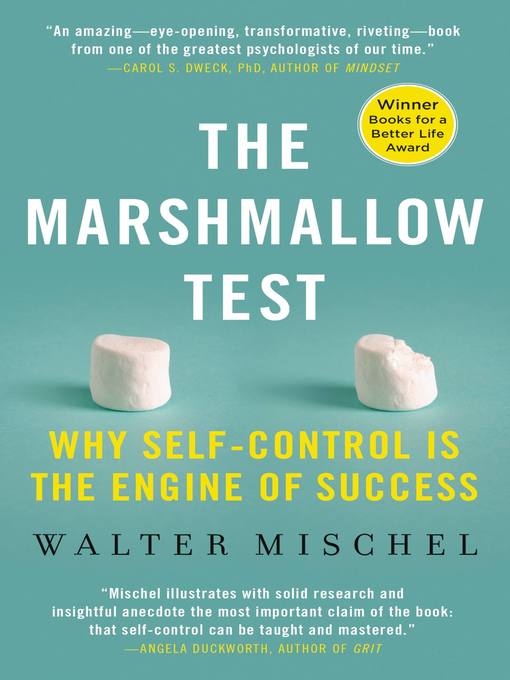
The Marshmallow Test
Mastering Self-Control
کتاب های مرتبط
- اطلاعات
- نقد و بررسی
- دیدگاه کاربران
نقد و بررسی

July 28, 2014
Mischel, the renowned psychologist behind the now-famous marshmallow tests of the 1960s, shares the culmination of over 50 years of research on willpower and self-control in this expansive, eye-opening book. The test was simple (a choice of one marshmallow now or two later on provided the means to quantify willpower), yet the results predicted future successes and failures, such that those with self-control as children displayed similar restraint as adults. In addition to an overview of the original longitudinal study, we are given insight into the history and physiology of self-control, its manifestations and its mastery. But, somewhat surprisingly, this book is largely about the ways in which self-control can be learned at any stage in life. Indeed “marshmallows” can take on many forms, as Mischel demonstrates through case studies and more contemporary tests. All of the anecdotes here, not to mention the entire chapter on practical applications, provide insight into how we can maximize our willpower—without overextending its potential. Mischel’s expansive scope makes the title somewhat of a misnomer, as the book covers more than a matter of his initial experiments. To be human is to grapple with the will: this stimulating book encourages us to make mindful decisions. Agent: John Brockman, Brockman Inc.

July 15, 2014
Mischel (Psychology/Columbia Univ.) argues that our ability to voluntarily exercise self-restraint in pursuit of that just-got-to-have-it desire provides children with a powerful tool that can help them succeed later in life.Numerous research studies have suggested that those who practice self-control do better on their SATs, have great reserves of self-worth, less stress, and have less incidence of obesity and addiction. These are preliminary findings, notes the author, who developed the classic "marshmallow experiment," which illustrates ideas of self-control and delayed gratification. The preponderance of evidence has not yet come down on one side or the other, and he acknowledges the powerful drive for instant gratification-he, too, wants it now, whatever it is, not at some nebulous time in the future. Mischel also notes that people with emotional grounding, advanced social skills and off-the-charts intellectual abilities can still be crippled by self-control issues. The exact source of self-control remains a mystery: Is it a product of nature, of nurture or an acquired cognitive skill of some kind? Researchers have been able to identity two types: "Hot" self-control is "emotional, reflexive unconscious"; the "cool" variety is "cognitive, reflective, slower and effortful." Undoubtedly, there will be nuances down the road, further complicating the picture, but for now, Mischel gets to the heart of the matter. "The emotional brain's predisposition to overvalue immediate rewards and to greatly discount the value of delayed rewards," writes the author, "points to what we need to do if we want to take control: we have to reverse the process by cooling the present and heating the future....push the temptation in front of you far away in space and time, and bring the distant consequences closer in your mind."No one will deny that self-control would make for a better planet, and this cogent guide suggests paths that may lead us to more conscious control of this desirable quality.
COPYRIGHT(2014) Kirkus Reviews, ALL RIGHTS RESERVED.

September 15, 2014
World-renowned psychologist Mischel's (Niven Professor of Humane Letters in Psychology, Columbia Univ.; coauthor, Introduction to Personality) latest work on self-control answers questions such as: Why do smart people do dumb things? Through a series of experiments (including the famed Marshmallow Test) conducted in a variety of settings, Mischel discovered that self-control can take different forms depending on the person. How can a politician have the self-discipline to make it through law school but give in to the temptation of a White House intern? According to Mischel, "self-control is an ability that can or cannot be used depending on motivation to use it." So how do we gain more of this ability, and why should we? Mischel lays out techniques such as if-then plans, self-distancing, and systematic desensitization as ways to delay gratification. Those who exhibited more self-control in the Marshmallow Test showed better quality of life later, including higher test scores, better social functioning, and lower BMI. However, Mischel warns that "a life lived with too much delay of gratification can be as sad as one without enough of it." VERDICT An excellent read on the latest developments in self-control, this title is highly recommended for those of us who struggle with discipline--i.e., everyone! [See Prepub Alert, 3/31/14.]--Jill Morningstar, Michigan State Univ. Libs., East Lansing
Copyright 2014 Library Journal, LLC Used with permission.

























دیدگاه کاربران